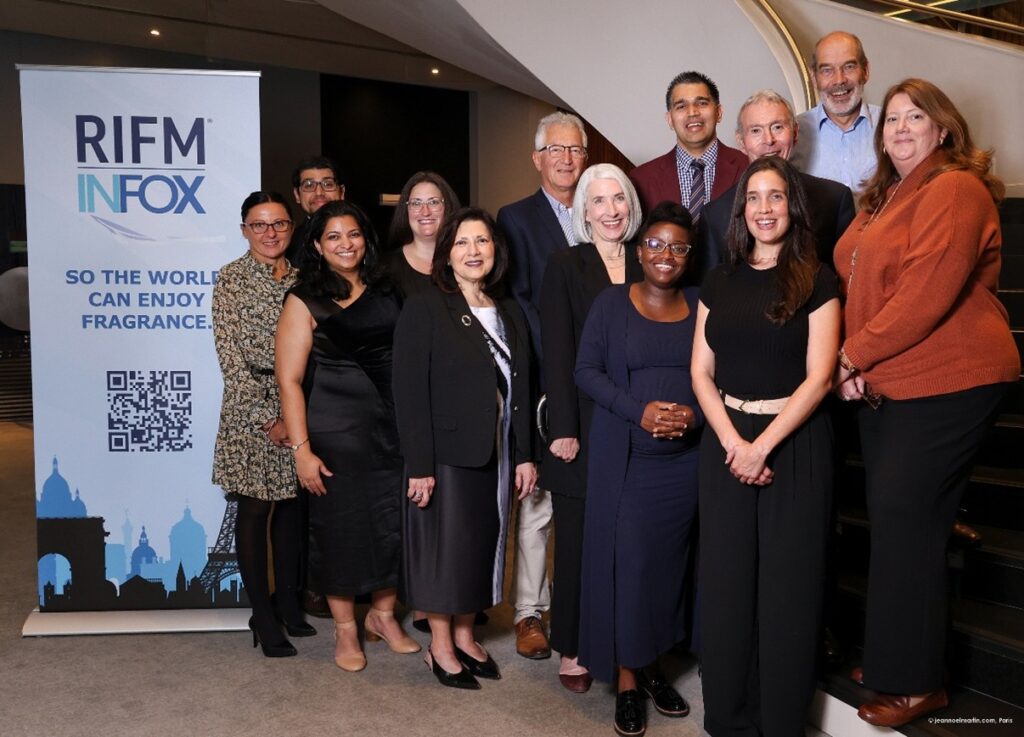Advancing Fragrance Safety Through Innovation, Science, and Collaboration: RIFM INFOX® 2025 in Paris
10.28.25
On September 29, 2025, fragrance safety experts, scientists, and industry leaders from around the world gathered at Le Méridien Etoile in Paris for RIFM INFOX® 2025, an immersive, full-day event dedicated to advancing fragrance safety through innovation, science, and collaboration.

Hosted by the Research Institute for Fragrance Materials (RIFM), this year’s program highlighted how decades of rigorous research and forward-looking methodologies continue to define global fragrance safety science. The day featured a dynamic lineup of presentations from RIFM scientists and members of the Expert Panel for Fragrance Safety, alongside interactive discussions that reinforced the importance of transparency, collaboration, and continual evolution in the field.
RIFM President Anne Marie Api, PhD, Fellow ATS, opened the event by welcoming attendees and reflecting on the Institute’s enduring mission.

“Fragrance safety is well-established, yet the science continues to evolve, enhancing confidence as tools, data, and understanding advance,” Dr. Api said. “What makes RIFM unique is how we integrate innovation with collaboration to ensure that every fragrance ingredient is assessed using the most current, comprehensive science available.”
The morning sessions focused on RIFM’s leadership in next-generation risk assessment, the power of data-driven exposure modeling, and new frontiers in environmental safety. Danielle Botelho, PhD, RIFM’s Director of Scientific Operations, illustrated how the Institute’s scientific framework has adapted to incorporate New Approach Methodologies (NAMs) and robust evaluation tools for both individual fragrance ingredients and complex natural substances.

In one of the day’s highlights, RIFM Principal Scientist Gretchen Ritacco, MS, presented the Creme RIFM Aggregate Exposure Model, showcasing how RIFM’s state-of-the-art system provides realistic exposure data that strengthen confidence in safety outcomes.
RIFM Principal Scientist Aurelia Lapczynski unveiled the next evolution of RIFM’s Environmental Framework 2.0, emphasizing ecological relevance and sustainability in fragrance safety evaluations, while Christen Sachse Vasquez, Executive Director, Technical Information & Services, traced the enduring impact of the RIFM Database, a cornerstone of evidence-based fragrance science for more than half a century.

Following a lively morning roundtable and networking lunch, the afternoon sessions turned to emerging challenges in reproductive toxicology, skin sensitization, and inhalation safety. Expert Panel Member Aldert H. Piersma, PhD, and RIFM Principal Scientist Kaushal Joshi, PhD, DABT, provided complementary insights into advancing reproductive safety through mechanistic understanding and real-world exposure data. RIFM Principal Scientist Isabelle Lee, PhD, detailed how RIFM’s integrated skin sensitization framework blends decades of experience with NAMs to reduce animal testing while maintaining scientific rigor.

In one of the day’s many engaging exchanges, Donald V. Belsito, MD, Chair of the Expert Panel for Fragrance Safety, returned to the podium for his talk, Those Contentious Hydroperoxides, shedding light on their role in skin allergy risk and regulatory assessment.
“The Panel’s role is to challenge, question, and refine,” Dr. Belsito noted. “That independent oversight is what keeps RIFM’s science both credible and globally relevant.”

The late afternoon brought further depth, with presentations from Expert Panel Member Professor Wolfgang Dekant, PhD, on evolving approaches to repeat-dose and genotoxicity testing, and RIFM Senior Scientist Holger Moustakas, PhD, on the integration of mechanistic NAMs for genetic safety. RIFM Principal Scientist Nikaeta Sadekar, PhD, DABT, explored respiratory safety and odor threshold research, while Dr. Moustakas demonstrated how chemical clustering strategies streamline assessments and enhance consistency across endpoints.

The day concluded with a closing roundtable and cocktail reception, where participants reflected on RIFM’s scientific legacy and its continued leadership in global fragrance safety.
INFOX® 2025 once again underscored RIFM’s commitment to collaboration and innovation, bringing together independent experts, researchers, and industry stakeholders to advance a shared mission: ensuring the safe and sustainable enjoyment of fragrance for people and the planet.
Missed us at INFOX? Register now for RIFM’s (free, online) 4th Annual Science Symposium!
